Next: Frontiers in Precision Health
As the COVID-19 pandemic made clear, disease risk and severity differ from person to person, each individual’s outcomes shaped by his or her unique mix of genetics, lifestyle, and environment. Precision health posits that healthcare should be shaped by this mix as well. Its emergence is a revolutionary moment, when medicine based on averages gives way to treatments tailored for each of us.
The joint UMass Medical School / UMass Lowell Center for Advancing Point of Care Technologies (CAPCaT) received a $120 million grant from the National Institutes of Health to lead the nationwide Rapid Acceleration of Diagnostics (RADx) Tech initiative, which is racing to bring 20 new pointof- care diagnostic devices through late-stage pre-clinical development and first-in-human clinical trials. CAPCaT capitalizes on expertise and support from UMass’s biotech and medical device incubator, the Massachusetts Medical Device Development Center, and was launched in 2018 with a $7.9 million grant as one of four centers in the nationwide NIH-sponsored Point-of-Care Technologies Research Network.
Physicians practicing precision health integrate three levels of information about their patients:
- Genetics and what they reveal about the active disease, future disease risk, and potential gene-based treatments
- Current and past health and lifestyle data points—from pulse measurements taken at the doctor’s office to exercises recorded by fitness trackers to MRI results—known to correlate with or predict health and disease risk
- Environmental and social factors— nutrition and food security, exposure to toxic hazards, poverty, housing instability, and incidents of violence—that are influencing patients’ health and well-being, as well as known gender-, race-, and ethnicity-based health inequities that could point to particular medical risks
Considering these factors is not new to medicine. The revolution lies in our rapidly growing power to gather this information and understand its relevance. Underlying each aspect of precision health is the ability to capture fine-grained health data, analyze it against population-sized data sets, and translate the findings into information patients and clinicians can act on. Advances in computing power and network speeds, digital devices, data science, and artificial intelligence are making widespread adoption of data-driven medicine possible for the first time.
Precision health can lessen side effects, improve outcomes, and prevent disease. On national and global scales, it is critical to prolonging productive life and well-being, making healthcare more efficient and less expensive, reducing health disparities, and responding effectively to public health crises. The federal government is investing in its promise: In 2016, President Obama launched a $215 million Precision Medicine Initiative; today, the FDA runs a computing platform for mining genomics data and the National Institutes of Health (NIH) is building a diverse nationwide medical database to support data-driven intervention.
Precision health requires expertise and collaboration across the disciplines of medicine, genomics, engineering, computing, big data analytics, public health, and social science. UMass’s strength in these areas; its track record of cooperation among campuses; its broad range of robust existing partnerships with other academic medical centers, the VA healthcare system, community health centers, and the biomedical industry; and its deep connections to urban and rural communities across the Commonwealth position it well to lead this burgeoning field and tackle the research frontiers that will transform the way healthcare is done.
A multi-university research consortium co-led by UMass Amherst biostatistician Nicholas Reich created some of the world’s most accurate flu forecasts by taking an ensemble approach: combining 21 forecasting models into one conglomerate that out-predicted its parts. The Centers for Disease Control and Prevention took note. In October 2019, the CDC awarded Reich a grant of up to $3 million over five years to run one of the nation’s two CDC Influenza Forecasting Centers of Excellence. In 2020, Reich and team tackled COVID-19, compiling nine models into an ensemble forecast that is informing the CDC and the White House Coronavirus Task Force.
Big Ideas
The ability to act on genes that contribute to disease is opening up new avenues of treatment, and UMass faculty discoveries are shaping genetics-based medicine. Craig Mello, a molecular biologist at the UMass Medical School’s RNA Therapeutics Institute, effectively launched the RNAi field in 1998 with his Nobel Prize–winning discovery of the RNA interference mechanism, which prevents certain genes from producing proteins. Medical school developmental biologist Victor Ambros’s Breakthrough Prize-winning discovery of microRNA— which also selectively shuts down gene expression—provided another promising mechanism for controlling genetic disease. More recently, UMass Amherst chemist Lila Gierasch was elected to the National Academy of Science for her work to understand protein folding, which has big implications for Alzheimer’s disease and other dementias thought to be protein-folding disorders.
Today’s strengths
Precision health is still in its infancy, but UMass has well-established and respected research efforts in many fields that are fundamental to the approach. The system’s strengths in the following five areas in particular are already moving precision health forward.
Genomics
An individual’s genes provide both a map to his or her risk for many diseases and a means of highly targeted treatments. UMass has great system-wide strength at the intersection of genomics and medicine.
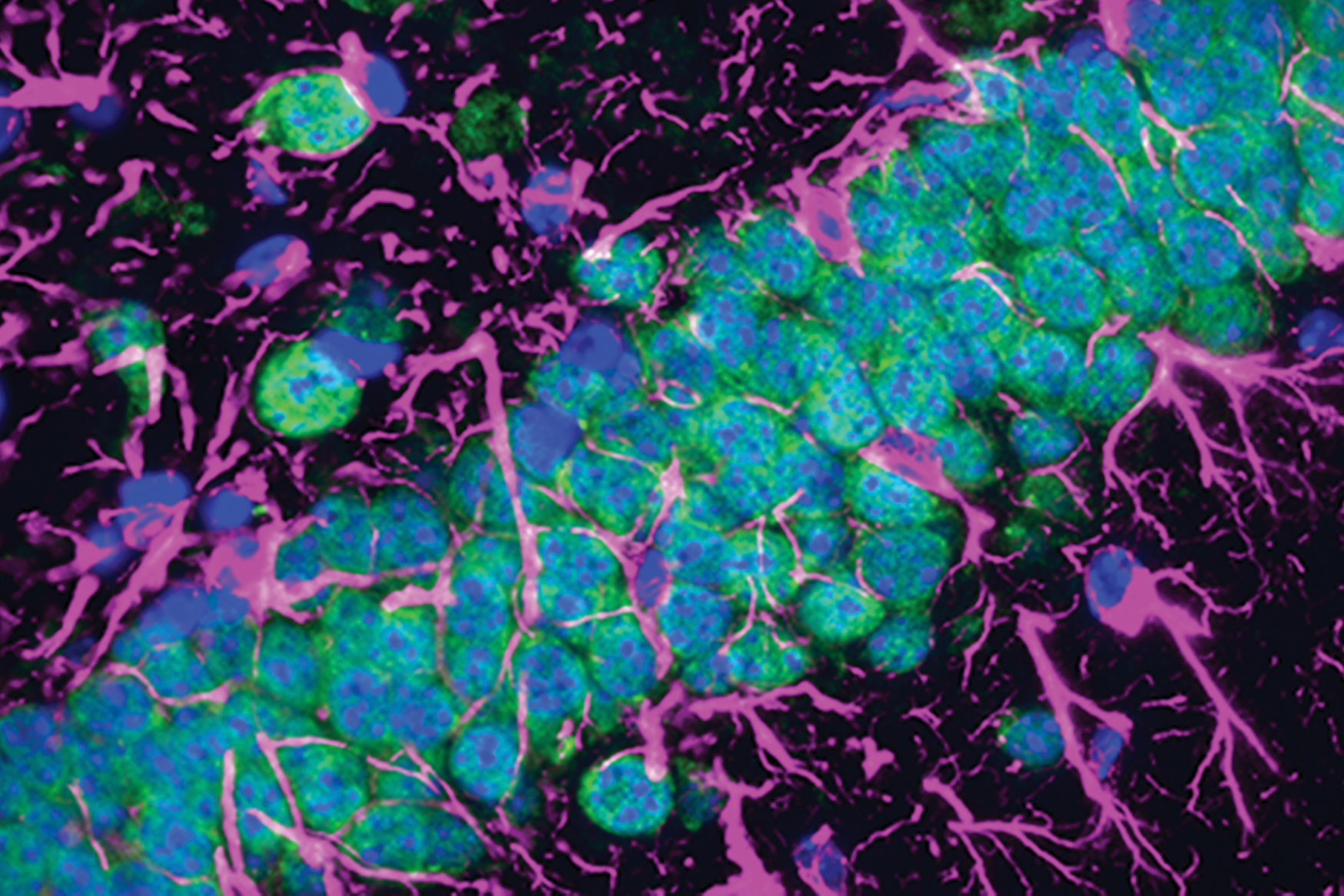 UMass is a world leader in genomics- based therapies, from the basic science to licensed drugs. The medical school’s RNA Therapeutics Institute is home to Nobel Prize–winner Craig Mello, who discovered the RNA interference mechanism, and to Philip Zamore, the co-founder of Alnylam Pharmaceuticals. Alnylam’s first drug, ONPATTRO, a first-of-its-kind RNAi therapeutic, was approved by the FDA in 2018 for treatment of hATTR amyloidosis in adults.
UMass is a world leader in genomics- based therapies, from the basic science to licensed drugs. The medical school’s RNA Therapeutics Institute is home to Nobel Prize–winner Craig Mello, who discovered the RNA interference mechanism, and to Philip Zamore, the co-founder of Alnylam Pharmaceuticals. Alnylam’s first drug, ONPATTRO, a first-of-its-kind RNAi therapeutic, was approved by the FDA in 2018 for treatment of hATTR amyloidosis in adults.
The nearby Horae Gene Therapy Center is developing innovative approaches to gene therapy for rare diseases like Tay Sach’s disease and common conditions like cardiac arrhythmias. Several of these therapies are now in clinical trials. The school also recently launched the Program in Human Genetics & Evolutionary Biology, a team focused on uncovering the genetic mechanisms behind a number of pervasive illnesses— research that will surely form the basis of new therapies in the future.
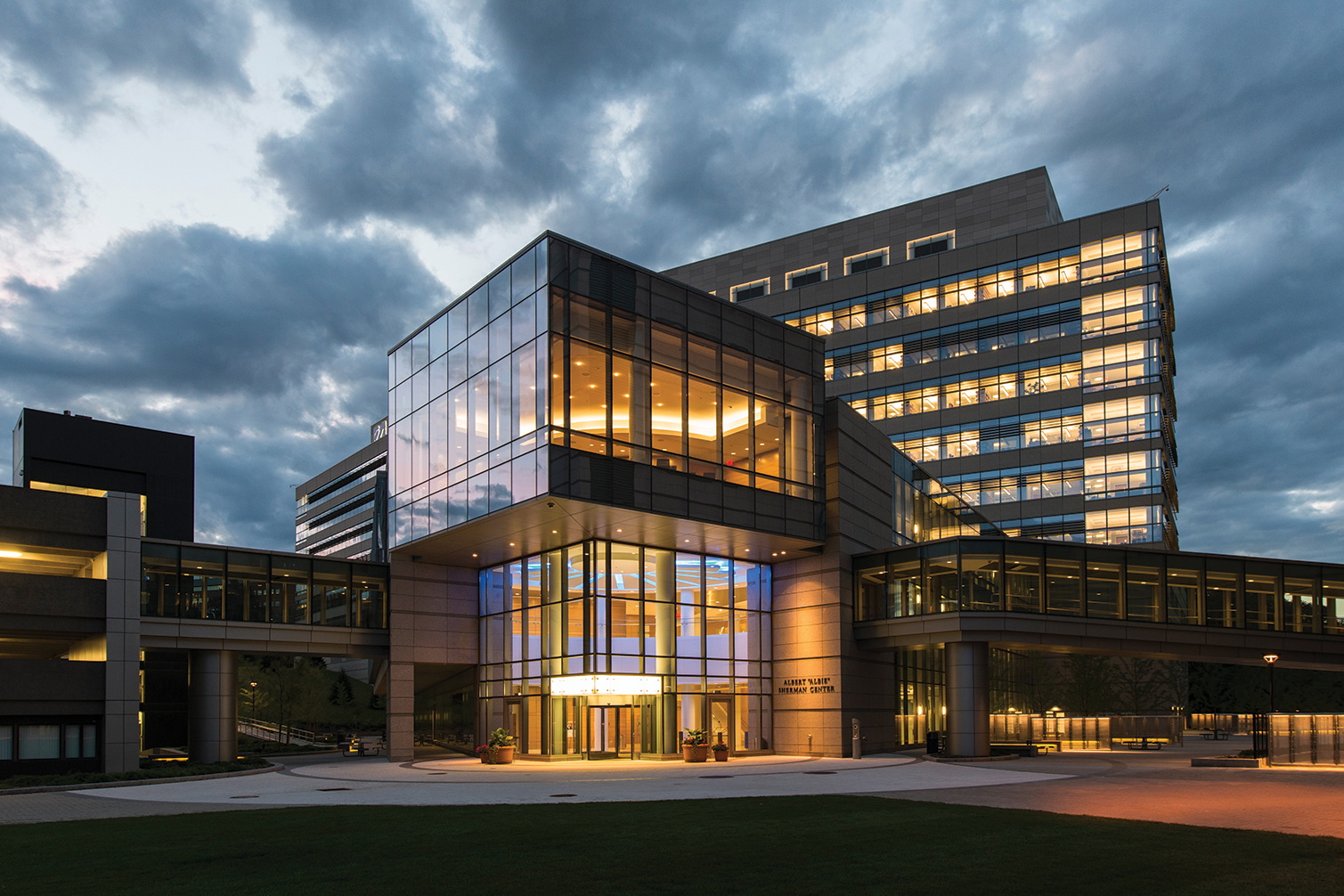
Identifying genomic disease biomarkers is a strong systemwide focus. One important example: UMass Boston’s Center for Personalized Cancer Therapy, a collaboration with Dana Farber/Harvard Cancer Center, pioneered the use of urinary liquid biopsies to find RNA biomarkers that predict kidney cancer diagnosis and prognosis. The medical school earmarked part of a five-year, $30 million NIH Clinical and Translational Sciences Award received in July 2020 to launch a new Integrative Biomarker Center that will apply powerful new technologies (proteomic, transcriptomic, and nanotechnologies) and integrative analytics to well-curated human samples in order to clarify biological pathways, provide insights into disease mechanisms, identify new therapeutic targets, and define novel biomarkers of disease or response to therapy.
UMass Amherst also houses a DNA and RNA analysis core facility, the Genomics Resource Laboratory, within its Models to Medicine Center, part of the university’s $150 million Institute for Applied Life Sciences.
Digital health
Point-of-care and personal devices are increasingly being used to collect, store, and exchange health information in real time and real-life settings. For example, mobile health apps on smart devices can be 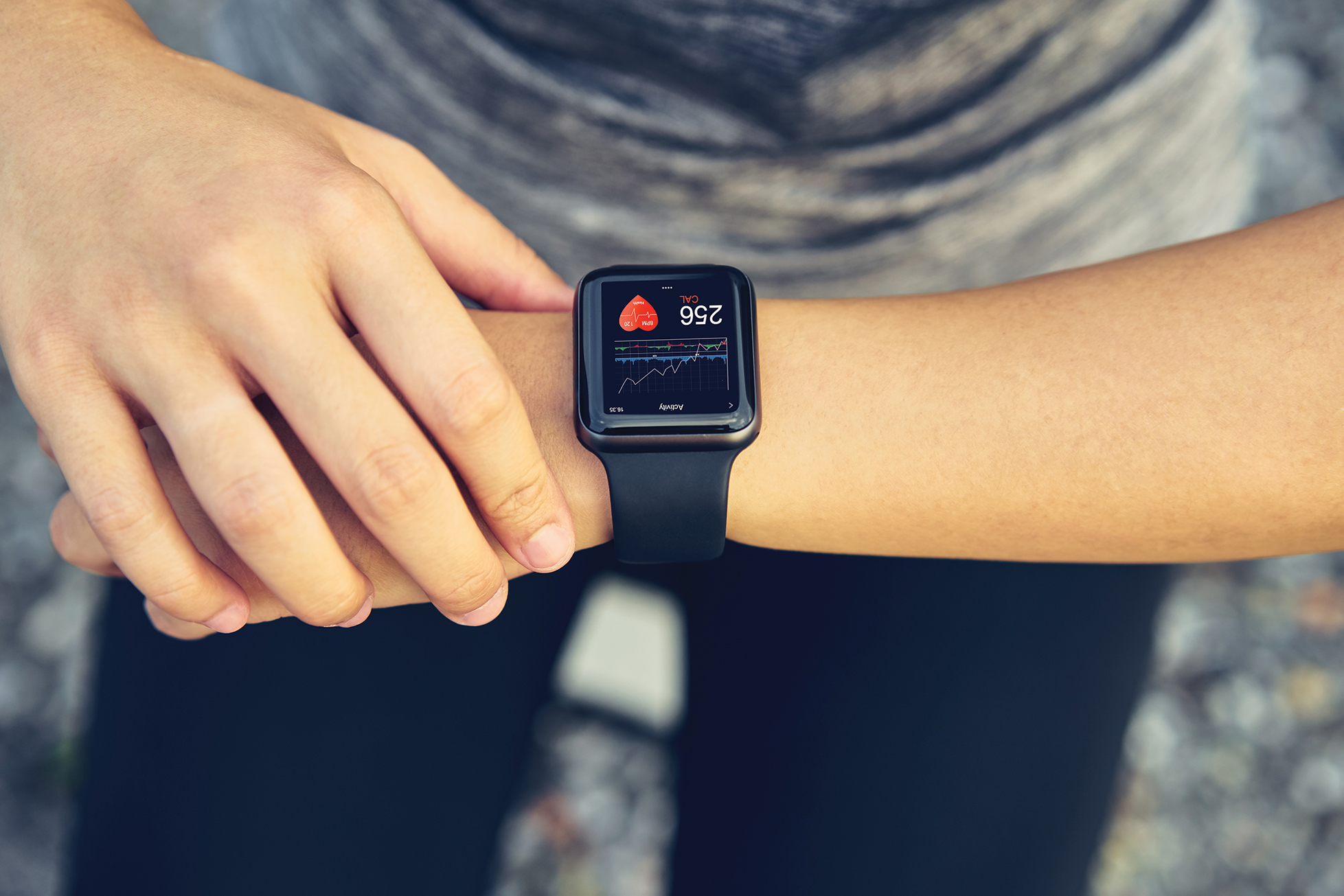 used to track nutrition, physical activity, blood pressure, and more. Continuous measurement of this kind is vastly more informative than point-in-time measurements taken at the doctor’s office.
used to track nutrition, physical activity, blood pressure, and more. Continuous measurement of this kind is vastly more informative than point-in-time measurements taken at the doctor’s office.
The UMass Center for Digital Health, a partnership across the Boston, Lowell, and Worcester campuses, is the system’s hub for digital health innovation. The center has millions of dollars in active research grants from National Science Foundation and the National Institutes of Health, including, for example, an $1.3 million NIH grant to improve tuberculosis diagnostics using deep learning- based approaches and mobile health technologies.
UMass is at the forefront of medical device development and manufacture in the Commonwealth. UMass Amherst’s Center for Personalized Health Monitoring, a $46 million, state-funded arm of the Institute for Applied Life Sciences, accelerates the development and commercialization of low-cost, multi-function, wearable, wireless sensor systems for personalized health care and biometric monitoring. One example: eyeglasses that track eye movements indicative of cancer-related fatigue, which help cancer survivors manage that problem. The Massachusetts Medical Device Development Center (M2D2)—a joint effort of UMass Lowell and UMass Medical School—is a collaborative product incubator for Massachusetts device companies. Since 2008, M2D2 has served 110 startups, which have raised $152 million in investments. In 2009, M2D2 received a $7.9 million grant from the National Institutes of Health to launch the Center for Advancing Point of Care Technologies (CAPCaT), an incubator focused on point-of-care diagnostic devices.
UMass Amherst’s Institute for Applied Life Sciences houses the Center for Bioactive Delivery, the Center for Personalized Health Monitoring, and the Models to Medicine Center.
Data science
Insightful analysis of data is central to precision health, and data science is a focus both nationally—through the NIH–sponsored National Center of Excellence for Mobile Sensor Data-to-Knowledge, for example, which UMass Amherst scientists help lead—and for more than 200 faculty members across the UMass system.
UMass Amherst’s Center for Data Science—funded by a $12 million grant from Mass Mutual and partnered with Google, IMB, Amazon, and other prominent data-driven companies— develops computational methods for acquiring and gleaning knowledge from “big data.” The campus’s Mobile Health Sensing & Analytics Laboratory (mHealth) is focused on gathering that data with smartphones and other mobile devices, providing a state-of-the-art testbed for researchers performing mobile health experiments at scale and developing personalized mobile health detectors.

At UMass Lowell, the Center for Biomedical and Health Research in Data Science, established in 2019, conducts cutting-edge informatics research to accelerate biomedical and healthcare discoveries. Investigators there have led more than $25 million in NIH-funded projects to develop innovative AI technologies for deep phenotyping, the cataloging and analyzing of physical characteristics associated with disease.
Researchers at the UMass Dartmouth Computational Statistics and Data Science Lab, supported by the NIH and NSF, also work in this space, developing methods for identifying behavioral trajectory patterns in biomedical and health data. Their DISCMIFuzzy software, for example, is used to uncover patterns in how substance users respond over time in clinical trials of multicomponent behavioral treatment programs, revealing which parts of the program are working for which patients at what time and to what degree, clarifying the efficacy of the trial and the effectiveness of the treatment.
Precision medicine relies on massive amounts of information to analyze, and the medical school maintains a Data Lake that includes information gathered from over 3 million patients during more than 78 million healthcare encounters. One user: the UMass Center for Microbiome Research.
Center faculty partnered with Philips Healthcare to create a cloud-based engine that can use genomic signatures of bacteria collected from patients and Data Lake records of patient tests and movements to identify and pinpoint the sources of outbreaks of bacterial infections acquired in hospitals, a major factor in the spread of multi-drug resistant germs.

Community engagement and health equity
Disparities in health risks and outcomes exist along racial, ethnic, gender, geographic, and socioeconomic lines, and the burden of disease falls heaviest on socially disadvantaged populations. One analysis of
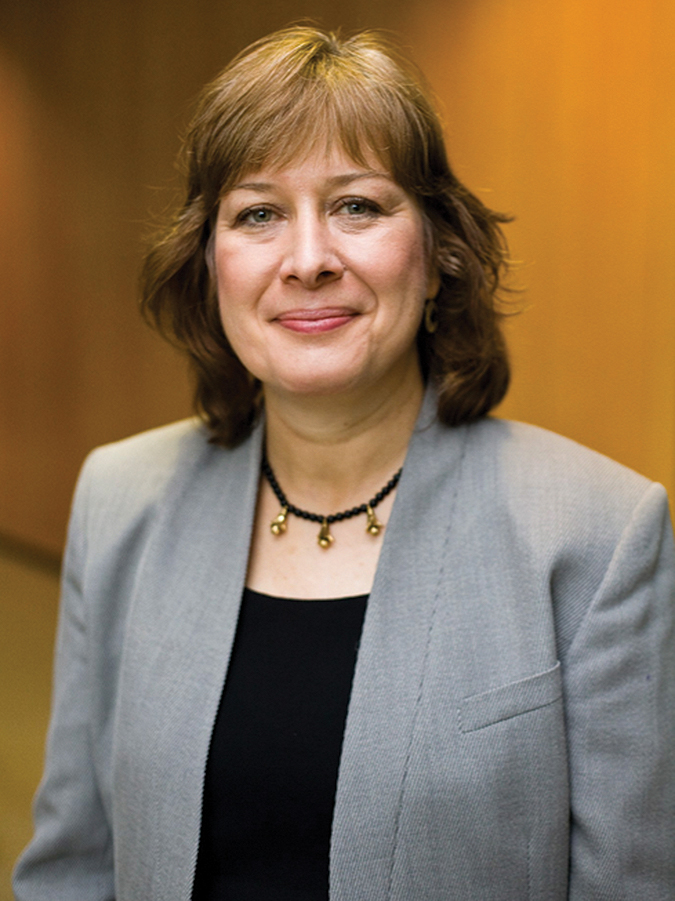
more than 47 million Americans with COVID-19, for example, found that hospitalization rates were three to four times higher for Black and Hispanic patients than white patients, and death rates more than double.
Understanding who these disparities impact enables doctors to proactively treat at-risk patients. Understanding why they exist is the first step to overcoming them. Increasing health equity is a focus of major research centers on all five UMass campuses.
UMass Amherst’s Institute of Diversity Sciences and Center for Community Health Equity Research and UMass Lowell’s $10 million, NIH-funded Center for Population Health (CPH) are all investigating the causes of health disparities, their consequences, and interventions that promote health equity.
CPH director Katherine Tucker is heading federally sponsored investigations into the factors controlling risk of cardiovascular disease in African Americans and postpartum diabetes prevention in Hispanic women. CPH is also setting up the building blocks required to deliver on the promise of precision nutrition—a new focus of the National Heart, Lungs, and Blood Institute—through research efforts related to dietary assessment tools, gut microbiome, metabolomics, and genomics applications in minority populations.
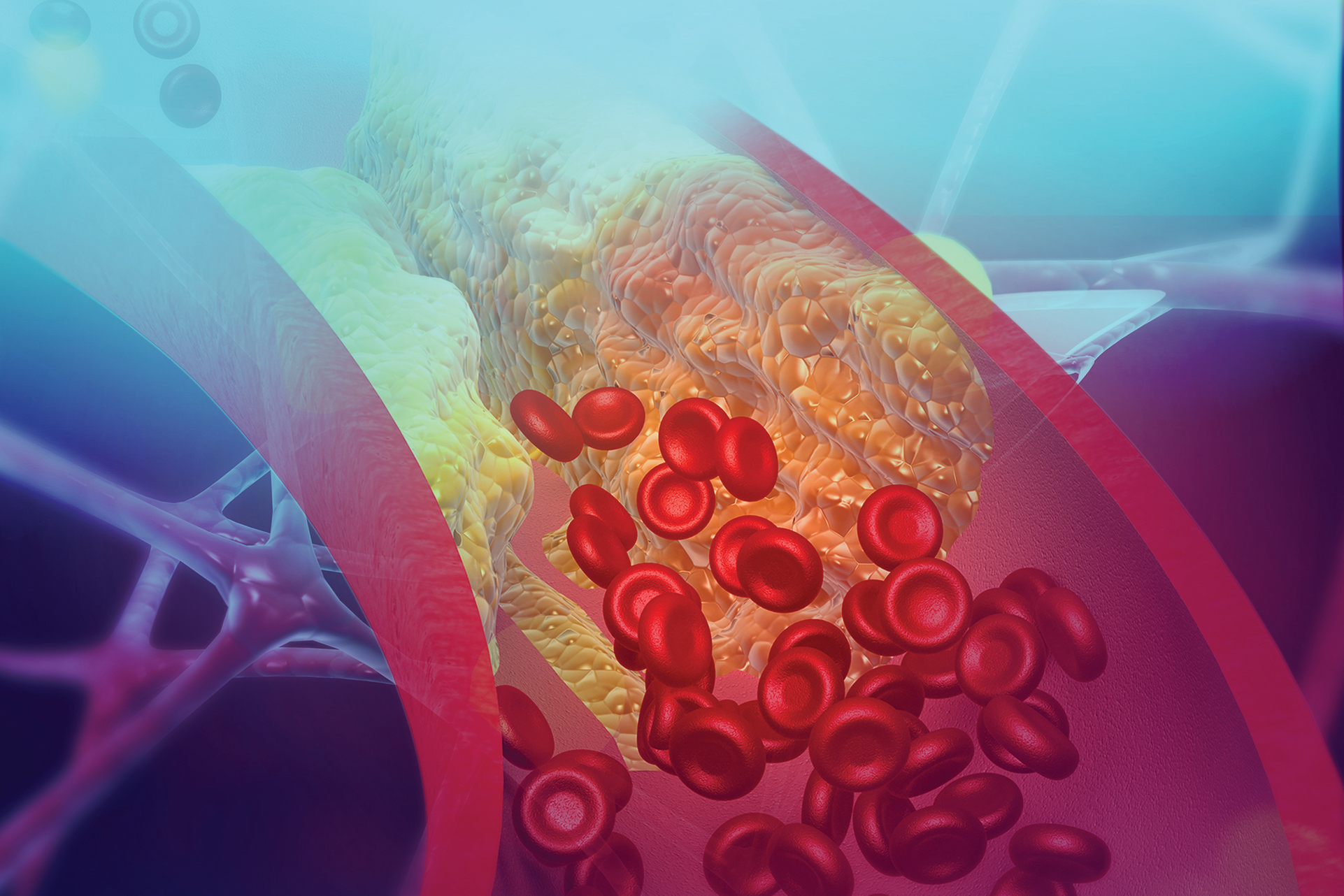 The UMass Lowell Center for the Promotion of Health in the New England Workplace is considering questions of health inequity from the perspective of employment, with particular focus on aging and disability. And the UMass Boston — Dana-Farber/Harvard Cancer Center Partnership focuses on overcoming disparities in cancer outcomes, running engagement programs focused on Latinx, transgender/ gender-nonconforming, female, and Black community members.
The UMass Lowell Center for the Promotion of Health in the New England Workplace is considering questions of health inequity from the perspective of employment, with particular focus on aging and disability. And the UMass Boston — Dana-Farber/Harvard Cancer Center Partnership focuses on overcoming disparities in cancer outcomes, running engagement programs focused on Latinx, transgender/ gender-nonconforming, female, and Black community members.
Underrepresentation of minority groups as subjects in medical research is a related, pervasive problem. Our understanding of disease processes, as well as the development of new therapies, is based on clinical trials that recruited a narrow range of people (in terms of age, race, ethnicity, socioeconomic status). When applied to a broader population, they do not always work as expected. Broadening representation in trials gives us a better understanding of how genetic and environmental factors contribute to disease risk, outcomes, and response to treatment. With support from the NIH, Stephanie Lemon, Worcester-based director of the UMass Center for Clinical and Translational Science Community Engagement Core, is partnering with two other universities to create a “storytelling” online consent platform designed to engage more African and Latinx Americans in clinical trials.
In a $2 million study funded by the National Cancer Institute, fellow medical school faculty members Sarah Forrester and Ann Moormann are also studying the power of storytelling to engage minorities in research—in this case, using narrative videos to increase representation of Black and Hispanic people in COVID-19 immunology and vaccine research.
Precision health workforce
In a recent national survey, medical professionals were enthusiastic about the potential of new 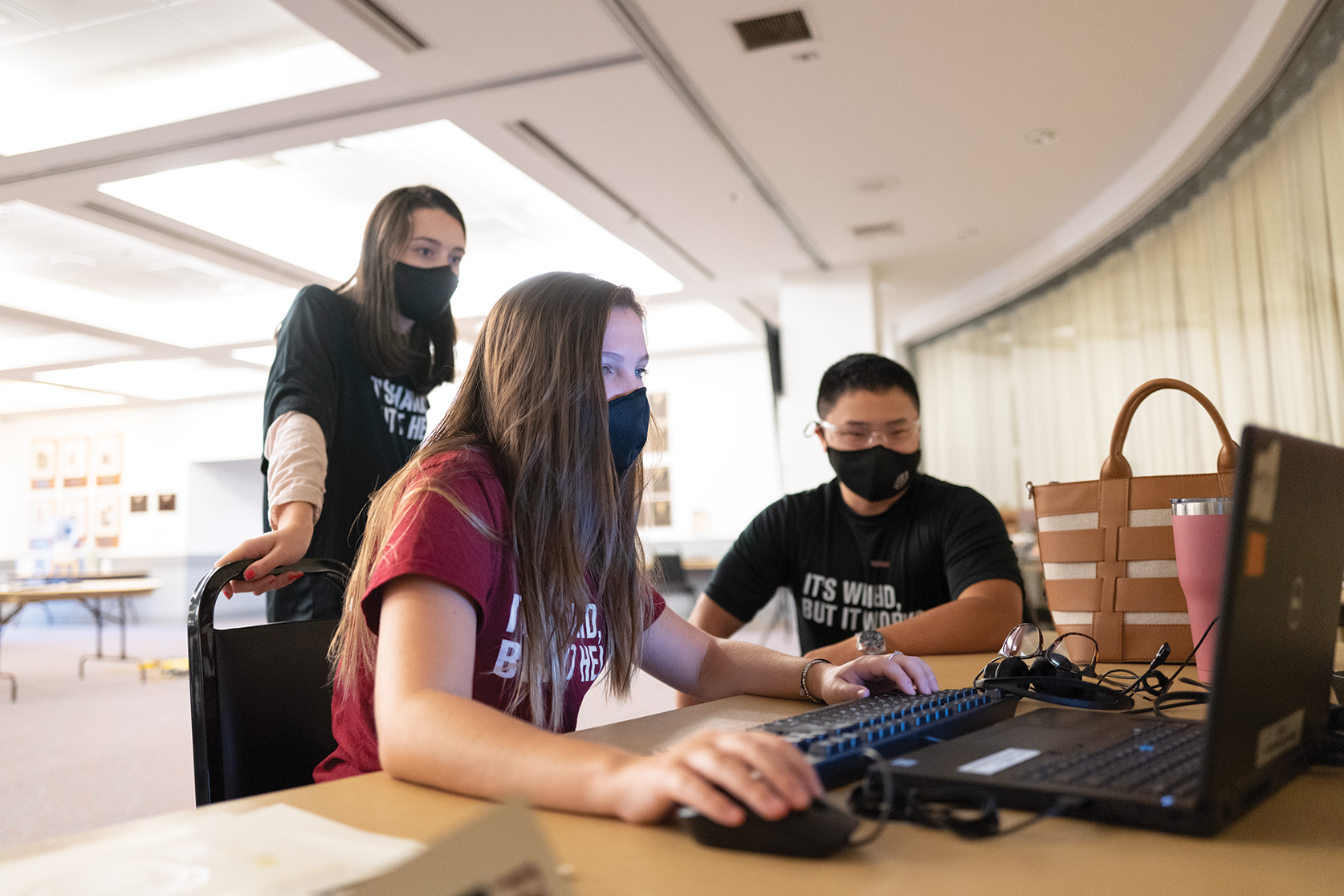 technologies to transform healthcare but also reported that the medical education they received did not fully prepare them to be data-driven doctors. UMass is committed to preparing a next-generation Massachusetts workforce capable of advancing data-driven healthcare. A host of innovative trans-disciplinary training programs across the five campuses are providing students, residents, fellows, and practitioners with both technical and clinical skills.
technologies to transform healthcare but also reported that the medical education they received did not fully prepare them to be data-driven doctors. UMass is committed to preparing a next-generation Massachusetts workforce capable of advancing data-driven healthcare. A host of innovative trans-disciplinary training programs across the five campuses are providing students, residents, fellows, and practitioners with both technical and clinical skills.
- At UMass Boston, the $5.1 million NIH-funded Comprehensive Partnership for Cancer Disparities Research has trained more than 300 undergraduate students from largely underrepresented populations in molecular biology and cancer research, enabling them to compete successfully for post- graduate degree programs and industry careers in the local life sciences cluster. Dana- Farber and Harvard University partner with UMass Boston to mount an innovative research and educational program that is specifically designed to increase the presence of minority researchers and medical professionals. Senior faculty mentor undergraduates, guiding them toward research careers focused on cancer, health disparities, and biomedical science.
- UMass Dartmouth’s data science bachelor’s and master’s degree programs train next-generation data scientists, including those in precision health.
- UMass Amherst’s Center for Data Science offers an MS concentration and a master’s level certificate in data science. The university’s Biomedical Engineering Department, launched in 2017, educates more than 300 undergraduates each year, and has strong doctoral and research programs, with several faculty labs located at the UMass Medical School. UMass Amherst also offers an Integrated Concentration in Science program that trains the university’s most promising STEM majors to be silo-breaking problem solvers, leaders, and innovators in science and technology, with a focus on biomedicine.
- UMass Lowell’s Biomedical Engineering Program prepares students for careers in the medical device, pharmaceutical, and biopharmaceutical markets, and created the first public, undergraduate degree program in biomedical engineering in Massachusetts.
Breast cancer is disproportionately deadly for Black women. UMass Boston Exercise Science Chair Julie Wright is exploring whether a digital exercise program for Black breast cancer survivors and their at-risk relatives can help improve their outcomes. During Wright’s 50-person pilot project, funded from the NIH’s $17.8 million grant to the UMass Boston/Dana Farber-Harvard Cancer Center Comprehensive Partnership for Cancer Disparities Research, participants will help her design a computer or mobile based intervention that will help them hit recommended exercise goals—and hopefully fend off cancer.
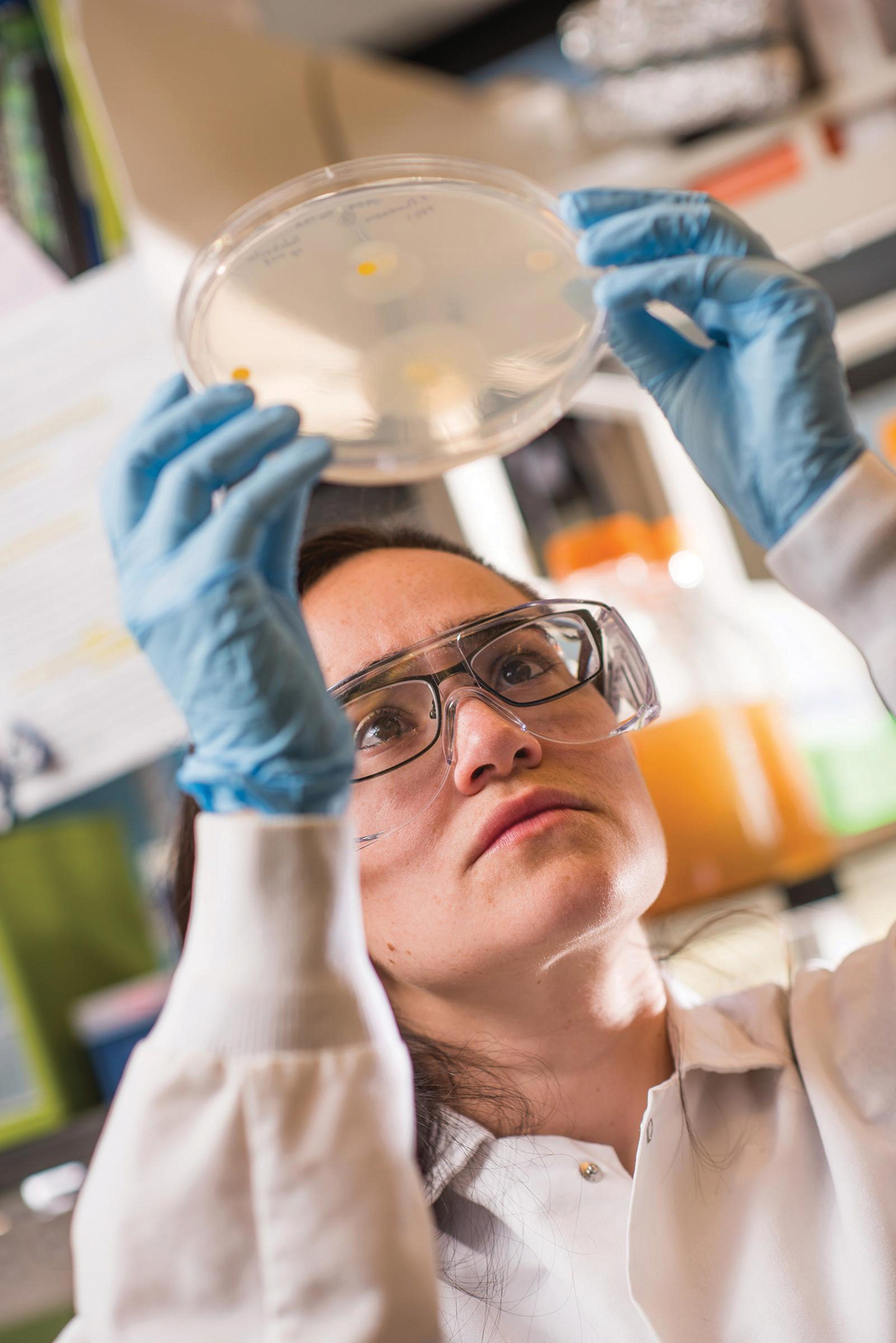
The campuses are also feeding the computing science pipeline. UMass Lowell’s CS Pathways program is a $1 million, National Science Foundation-funded project that is developing inclusive, culturally responsive, and sustainable data science programs at the middle school level. UMass Amherst established the Commonwealth Alliance for IT Education (CAITE), a system- and state-wide effort that addressed underrepresentation in IT by creating public school computing curricula, teacher trainings, and youth programs. CAITE grew into the 23-state NSF- funded consortium Expanding Computing Education Pathways (ECEP), a national program originally co-directed by UMass Amherst faculty, which helped create nationwide computer science certification standards for K–12 teachers.
Newborns with severe combined immunodeficiency (SCID) die from infection in infancy without treatment. The treatments work best before infection strikes, but because babies with SCID appear healthy, the disorder often isn’t diagnosed until they fall ill. Anne Comeau, deputy director of UMass Medical School’s state-wide New England Newborn Screening Program, led a CDC-funded pilot project demonstrating that widespread DNA testing for SCID was possible. In 2009, Massachusetts became the second state in the country to screen all newborns for SCID. Today all newborns in the US are tested for the disease, enabling early diagnoses that allow them to live long and healthy lives.
Tomorrow’s frontiers
UMass’s strengths in genomics, data science, artificial intelligence, medical device development, and population medicine today are setting the stage for big advances in precision health tomorrow. Here, we highlight five vital research frontiers that UMass will be pursuing over the next five to ten years.
Patients with irregular heartbeat are at risk for stroke. But population studies show that only three-quarters of eligible atrial fibrillation patients are on anti-clotting medication to prevent stroke. To overcome this treatment gap, UMass Medical School cardiologist David McManus, director of UMass Memorial Healthcare’s Atrial Fibrillation Treatment Program, developed and tested an algorithm that mines UMass’s digital medical records to find at-risk patients and, when one has an appointment coming up, automatically flags his or her electronic chart with an alert reminding the doctor to discuss anti-clotting meds as a treatment option. The system, which has since been adopted by the University of Florida medical system, succeeded in increasing use of the treatment. As a result, UMass Memorial was one of only twelve healthcare systems in the nation to earn a Gold Award for Atrial Fibrillation Quality of Care from US News and World Report in 2017.
Next frontier 1: Create genomics-informed disease prevention, diagnosis, and treatment plans
The coming decade will see the emergence of precision genomics: the application of genetic data for individualized patient diagnosis and treatment. Drawing on our existing strength in genomics and data analysis, UMass is poised to create a bench-to-bedside model of genomics-informed patient care for a range of common and rare diseases, including diabetes, cardiovascular disease, cancer, mental illness. Our efforts will bring together researchers studying the role of genomic variation in human health with those who design personalized risk assessments, diagnostic and prognostic protocols, gene and RNA-based therapies, and other approaches to predict, prevent, and treat disease.
Next frontier 2: Design next-generation, useful, and usable digital health technologies
The development of 5G (and then 6G) wireless networks, with their capacity to transmit huge amounts of data at rates 10 to 100 times faster than 4G, promise to supercharge “smart” medical devices, opening the door to fast processing and sharing of high-resolution images, enhanced telehealth, longterm remote monitoring, and more. UMass will bring together technologists, clinicians, and behavioral scientists to develop digital health monitoring, imaging, and AI-enabled data processing tools that take advantage of advances in computing power to gather, analyze, and share health data in ways that improve patient health and clinician productivity.
This work has already begun. UMass Dartmouth’s Internet of Things and Data Engineering Lab, for example, is currently developing a 5G wireless body-sensor system that could be used for detecting and predicting life-threatening events, monitoring illicit drug use, and biosensor-based randomized controlled trials.
Next frontier 3: Translate complex health data into actionable knowledge
Any advancement in precision health will require advanced data mining, and UMass will be increasingly focused on synthesizing: drawing usable insights from longitudinal patient data from electronic health records, point-of-care devices, mobile health apps, and more to improve medical decision making. This
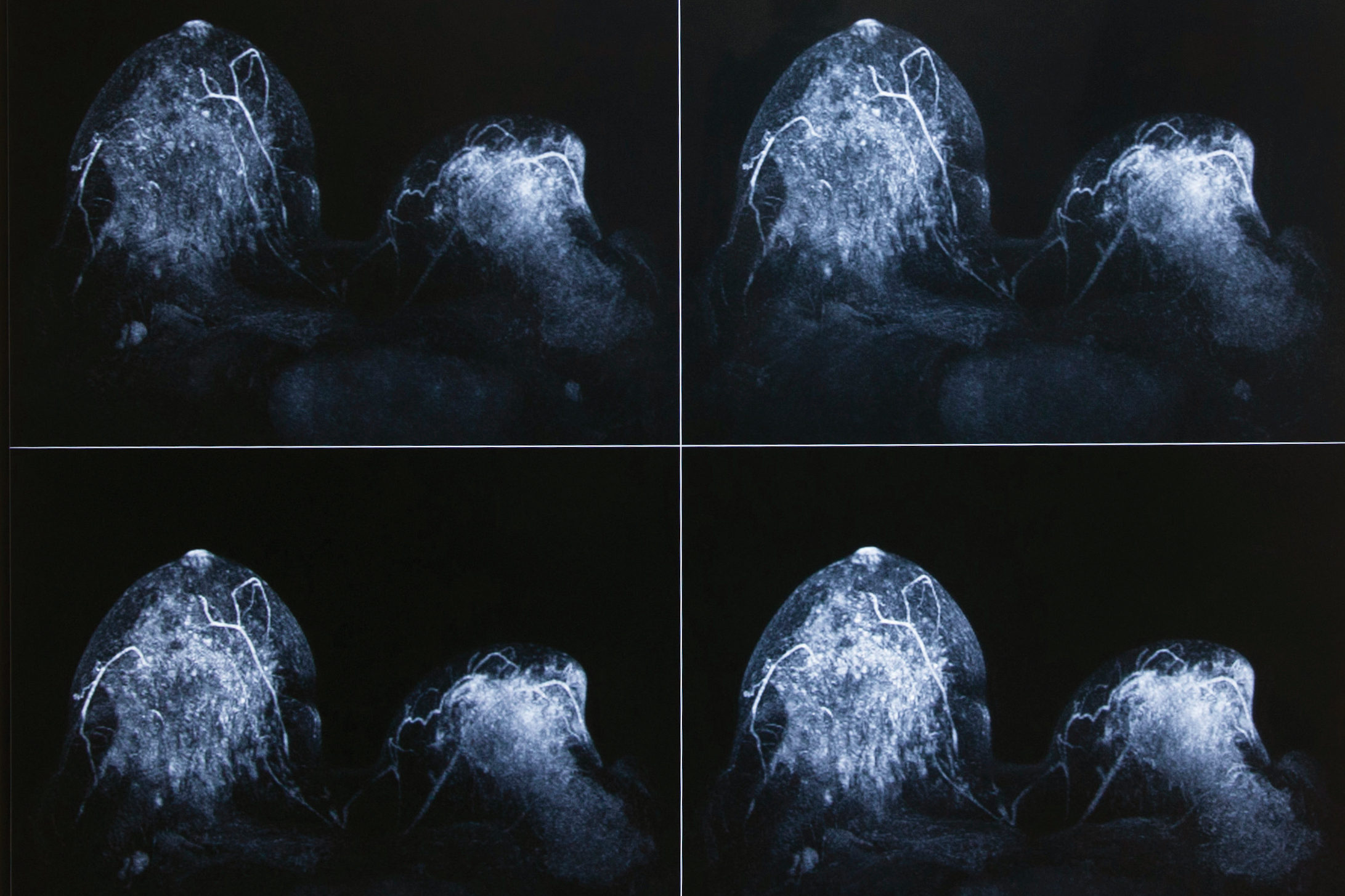
work will follow from projects like UMass Boston’s Oregon - Massachusetts Mammography Database (OMAMA-DB), recipient of a $750,000 Bits to Bytes grant from the Massachusetts Life Sciences Center. This team, in partnership with local startup DeepHealth, is using its large database of breast tissue scans and associated results to develop intelligent data-labeling methods and train deep-learning systems to identify earlier signs of breast cancer in mammograms.
On the distant horizon, advances in quantum computing will transform data analysis and AI-enhanced decision-making, turbo-charging drug design, DNA sequencing, and all aspects of precision medicine that require the crunching of big data.
Next frontier 4: Use data and technology to improve health equity
The advances described above are exciting and transformative, but care must be taken that they leave no individual or population behind.
UMass will partner with the members of our diverse local communities and care settings to ensure that all of our work in precision medicine improves health equity. UMass will focus most intensely on closing racial and socioeconomic gaps in the prevention, diagnosis, and treatment of cancer, cardiovascular disease, diabetes, mental health, and neurodegenerative disorders.
There cannot be health equity without equitable access to the most fundamental necessities of life: food, housing, clean water, clean air, and safety. Hunger and health complications caused by poor nutrition are still a nationwide problems in the US and around the world, something that should be unthinkable in the 21st century.
UMass has both the research strength and—as a public institution—the moral obligation to engage in “primary prevention” that uses modern technologies to stop health issues caused by lack of basic needs before they start. An important frontier for the future is exploring how medical point-of-care technologies can be used to identify at-risk people and ensure they get the food, water, and shelter they need.
Next frontier 5: Train an innovative, data-driven, and technology-informed precision health workforce
No matter how powerful, precision health methods and tools will only be as useful as the capacities of medical professionals to use them. Indicators show that technology knowledge gaps are already a problem. In the Massachusetts Biotechnology Education Foundation’s 2019 Massachusetts Life Sciences Employment Outlook, almost a third of surveyed life science companies in the state found that a lack of applicants with needed scientific or technical skills was an obstacle to hiring.
Universities will play a critical role in imparting these skills, and UMass has already emphasized training an interdisciplinary, technology- savvy, data-literate healthcare and research workforce for the medical professions of tomorrow. Graduating precision-health trained candidates— and supporting a computing-aware STEM pipeline—will position the Commonwealth to lead the data- driven, technology-enabled precision health revolution.
Nearly a million people in the US are living with Parkinson’s disease, a degenerative brain disorder with no known cure or cause. Scientists do know, though, that most patients experience gastrointestinal issues years before their PD diagnosis. In 2017, UMass Lowell neuro-epidemiologist Natalia Palacios, who studies the “gut-brain axis” in health and disease, was awarded a $2.1 million grant by the NIH to search for patterns in gut bacteria populations that correlate with Parkinson’s disease—links that could lead to earlier diagnosis, new treatments, or even a cure.
Supplying the hub of the precision health industry
One-size-fits-all medicine is expensive. Treatments based on what is effective for the average patient—rather than what genetics, medical history, and circumstances suggest would work best for this patient—can have a significant failure rate, leading to more visits, more treatments, and longer sickness.
A 2020 report by the Personalized Medicine Commission put the annual cost of sickness and death related to prescriptions that don’t work, cause problems, or aren’t taken at between $4.9 and $6.7 billion. Precision medicine promises to increase efficiency, cutting healthcare costs while improving outcomes.
Precision medicine is also spurring developments in genetics-based pharmaceuticals and digital medicine platforms and devices. Market researchers expect the global precision medicine market, valued at about $58 billion in 2019, to reach as much as $141 billion by 2027, largely driven by rising use of personalized cancer approaches like immunology.
North America dominates this market today, according to a 2020 Visiongain report, and Massachusetts is a major hub. Of the 20 companies a 2020 Research and Markets report lists as major players in the global precision medicine market, thirteen are either are headquartered in the Commonwealth (like ThermoFisher Scientific, N-of-One, and Tempus) or have offices or research hubs in the state, including Pfizer’s global headquarters for therapeutic innovation and 70-acre manufacturing center. Massachusetts ranks second among states in medical device patents and is home to 420 medical device companies, which raised $369 billion in venture capital funding in the first three quarters of 2020.
More than 350,000 citizens of the Commonwealth work in jobs related to precision medicine today, and employment in the field is expected to grow by 7.2 percent over the next ten years, outpacing overall projected growth rates in the state. Projections show that Massachusetts employers will need to fill 30,800 related to precision health by 2030.
Where will qualified candidates for those positions come from? In the Commonwealth, the majority will be graduates of the University of Massachusetts. In 2019, UMass awarded 18 percent of all related degrees conferred in the state, making the system the top producer of degree-holders in our region.
Early detection of cognitive impairment in older adults with dementia is crucial to keeping them safe and healthy, especially if they live alone. Sponsored by the NIH, UMass Boston computer scientist Xiaohui Liang is developing an inexpensive, passive, and practical home method for assessing cognitive decline, using Voice Assistant Systems like Amazon’s Alexa and data-mining techniques that analyze changes in speech over time. If it works, the system could easily be widely used to help identify patients with burgeoning dementia and help them stay independent longer.
Massachusetts employment data in occupations related to precision medicine:
UMass degree completions in fields related to precision medicine:
Precision health is still a nascent field. UMass is emerging as one of the institutions that will lead it into the future.
Why? Certainly because our research strengths align with the drivers of the field. And because we are committed to being a global force in the delivery of precision medicine, precision nutrition, and disease prevention. But also because of the UMass system’s ability to bring together experts from diverse disciplines to forge new ways of looking at topics that really matter.
One example is our Center for Microbiome Research, which spans three campuses with 40+ investigators, who are bringing the insights of data science, microbiology, and medical science together to design treatments for a wide range of conditions, including dementia, multiple sclerosis, and inflammatory bowel syndrome. Another is our Center for Data Science, with more than 200 affiliated researchers from all five campuses. The RADx COVID-19 initiative—dependent upon collaboration between the medical school and UMass Lowell, bringing together engineers, medical practitioners and public health experts—is a third. And precision health, which touches on all of these topics, promises to be another.
Of course, these collaborations extend beyond our campuses. As always, we look to industry as a partner in innovation and application. We are confident that, over the coming decade, UMass will create the precision health methods and tools that will transform the healthcare is done in Massachusetts—and train the tech-literate workforce that does it.
Government support has spawned the advances we have made so far, and those investments will continue to bear fruit. The University is proud to lead the healthcare field into this revolutionary moment, and to explore the frontiers ahead.
Babies born premature are at risk for dangerous health conditions like pauses in breathing, slow heart rate, and low blood oxygen. With NSF funding, UMass Dartmouth computer engineer Honggang Wang, director of the Internet of Things and Data Engineering Lab, is creating a lightweight, wireless-networked, wearable biosensor system to remotely predict and detect life-threatening events in newborns. The system incorporates wireless body area networks and advanced signal processing approaches,
tailored to an individual infant’s body, to accurately detect
problems as they begin.
Dig deeper
Research related to precision health is happening in labs and centers across the University of Massachusetts. Visit the links below to find out more about the work going on our campuses and the researchers conducting it.
Genomics
- Genomics Resource Laboratory (Amherst) www.umass.edu/ials/genomics
- Models to Medicine Center (Amherst) www.umass.edu/m2m
- Center for Personalized Cancer Therapy (Boston) www.umb.edu/cpct
- Program in Human Genetics & Evolutionary Biology (Worcester)
- Integrative Biomarker Center (Worcester) www.umassmed.edu/InBioC
- RNA Therapeutics Institute (Worcester) www.umassmed.edu/rti
- Horae Gene Therapy Center (Worcester) www.umassmed.edu/gtc
Digital health
- Center for Digital Health (Lowell) www.uml.edu/research/digital-health
- Center for Personalized Health Monitoring (Amherst) www.umass.edu/cphm
- Massachusetts Medical Device Development Center (Lowell, Worcester) www.uml.edu/research/m2d2
- Center for Advancing Point of Care Technologies (Lowell, Worcester) www.poctrn.org/-/umass
- IoT and Data Engineering Lab (Dartmouth) honggang.wang.faculty.umassd.edu/IOTDELAB
Data science
- Center for Data Science (Amherst) ds.cs.umass.edu
- Mobile Health Sensing and Analytics Lab (Amherst) www.umass.edu/ials/mhealthlab
- Center for Biomedical and Health Research in Data Science (Lowell) www.uml.edu/Research/CHORDS
- Data Lake (Worcester)
- Computational Statistics and Data Science Lab (Dartmouth) www.umassmed.edu/fanglab
Community engagement and health equity
- UMass Center for Clinical and Translational Science Community Engagement Core
- UMass Boston/Dana Farber-Harvard Cancer Center Partnership (Boston) www.umb.edu/u54
- Institute of Diversity Sciences (Amherst) www.umass.edu/diversitysciences
- Center for Community Health Equity Research (Amherst) www.umass.edu/health-equity
- Center for the Promotion of Health in the New England Workplace (Lowell) www.uml.edu/research/cph-new
- Center for Population Health (Lowell) www.uml.edu/research/uml-cph
Precision health workforce
- UMass Boston/Dana Farber-Harvard Cancer Center Partnership (Boston) www.umb.edu/u54
- Biomedical Engineering Program (Amherst) bme.umass.edu/UMA
- Biomedical Engineering Program (Lowell) www.uml.edu/engineering/biomedical
- Data Science Training Programs (Amherst, Dartmouth, Lowell)
- CS Pathways (Lowell) cspathways.org/people
- Innovative Programs to Enhance Research Training (Worcester)
Our thanks to the members of the precision health faculty committee, who generously contributed their time and expertise to the creation of this report:
- Katherine Luzuriaga, UMass Medical School (co-chair) Vice Provost, Clinical and Translational Research | UMass Memorial Health Care Endowed Chair, Biomedical Research Professor, Molecular Medicine and Pediatrics and Medicine | PI and Director, Center for Clinical and Translational Science
- Hong Yu, Umass Lowell (co-chair) Professor, Computer Science | Director, Center of Biomedical and Health Research in Data Sciences
- Hua Fang, UMass Dartmouth Associate Professor, Computer & Information Science
- Jill Macoska, UMass Boston Alton J. Brann Endowed Distinguished Professor, Science and Mathematics and Cancer Biology Professor, Biological Sciences | Director, Center for Personalized Cancer Therapy Jenna Marquard, UMass Amherst | Professor, Mechanical and Industrial Engineering